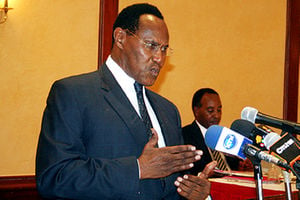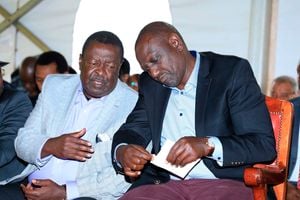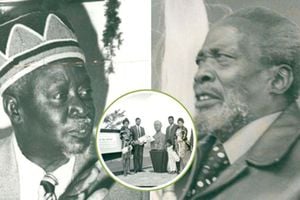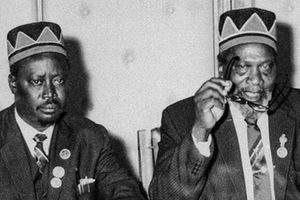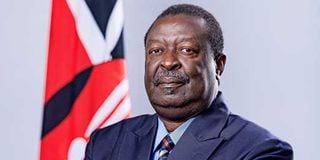
Prime Cabinet Secretary Musalia Mudavadi.
In the dramatic 1989 cabinet reshuffle sparked by the political downfall of Vice-President Josephat Njuguna Karanja and the ascension of Prof George Saitoti to the vice-presidency, a young Wycliffe Musalia Mudavadi emerged as the surprise star. At just 29 years, Mudavadi was appointed Minister of Supplies and Marketing, securing his place in history as one of Kenya’s youngest-ever cabinet minister.
His meteoric rise shocked not only the nation but Mudavadi himself. Years later, his elevation to vice-president in the twilight years of the Moi era was no less surprising. His tenure was, however, the shortest ever.
When he used to play Rugby for the University of Nairobi’s Mean Machine, his teammates nicknamed him “Phantom.” In the world of politics Mudavadi, who is the Prime Cabinet Secretary in charge of the Foreign Affairs docket, seems to live up to his nickname. He towers quietly as an elusive force that influences power dynamics behind the scenes. Like a phantom, he bears this ghostly presence, never fully present but so strongly moving like a hurricane.
In the dying days of the Kanu regime, as President Daniel arap Moi manoeuvred to secure a successor, Mudavadi made a bold declaration on July 27, 2002, announcing his candidacy for the presidency under the Kanu banner – this, despite Moi’s explicit endorsement of Uhuru Kenyatta. As the anti-Kenyatta group, led by Raila Odinga, consolidated its power, Mudavadi defected to the Rainbow Alliance, a formidable coalition of key political figures, including Kalonzo Musyoka, Raila Odinga, Moody Awori, and George Saitoti; all of whom stood united in defiance of Uhuru Kenyatta’s candidacy.
However, in a startling turn of events on September 4, Mudavadi abruptly abandoned the Rainbow Alliance, executing a swift political about-face by rejoining Uhuru’s camp.
His return to the fold did not go unnoticed, and by November 2002, President Moi rewarded his loyalty by appointing him vice-president, a position that had been vacated by the ousted Prof Saitoti just days prior, on August 30.
Something else attracted him back: Mudavadi was a childhood friend of Moi’s children and survived in politics, thanks to Moi’s patronage. Leaving Moi at such an hour was betrayal.
Named as Uhuru Kenyatta’s running mate, Mudavadi’s political ambitions were decisively thwarted in December 2002 when the two were soundly defeated by Mwai Kibaki’s Narc.
For Mudavadi, it was a bitter and humiliating defeat, marking his first major political loss. So profound was the setback that he declined the opportunity to be nominated to Parliament, retreating from the immediate political scene in the wake of his dashed aspirations.
Informed choice
Mudavadi declared: “The people of Sabatia made a conscious and informed choice to elect someone other than myself. As such, I cannot, in good conscience, accept entry into Parliament through any alternate means, for doing so would be a grave affront to the will of the electorate.”
On February 6, 2003, Mudavadi took a further step in relinquishing his leadership roles, stepping down as one of Kanu’s vice-chairmen and as the branch chairman of his Sabatia constituency.
He urged his fellow party officials to follow suit and make way for fresh leadership, asserting: “When a ruling party is defeated as decisively as Kanu was, the only honourable course is for all office bearers to step aside, allowing space for new voices and ideas to invigorate the party.”
In November 2003, after months of political quietude and personal reflection, Mudavadi made a return to the national stage, aligning himself with the LDP wing of Narc. Reflecting on his decision, he explained it was made “after a long period of soul-searching”, signalling his re-entry into the political arena, renewed and redefined.
As son of Moses Mudavadi, a titan of Kenya’s political arena, Musalia is a beneficiary of dynasty politics that shaped Moi’s hold onto power. But, again, he had a godfather, Moi.
With the former president’s patronage, the young Mudavadi’s ascent in the national landscape seemed destined. Few dared cross him, not out of fear, but because he exuded an air of harmlessness, his words always carefully measured, if not delicately diplomatic.
Thrust into the limelight, the young politician from Vihiga bore the weight of immense expectations, not only to mirror his father’s influence but to forge his own distinct path through the labyrinth of Kenyan politics.
When President William Ruto named him Prime CS, Mudavadi, ever understated, calmly revealed a net worth of Sh4 billion.
Today, he stands as a billionaire, Kenya’s yardstick of a political life well-navigated without being in the crosshairs. But unlike other political billionaires whose sole cash crop is politics, Mudavadi is mild-mannered, composed and exhibits no flamboyance.
Over the years, he has mastered the subtle art of political self-preservation, never hesitating to distance himself from controversy, or throw colleagues under the bus; whichever works faster.
He will also abandon his friends with ease at the ultimate hour if he detects the faintest whiff of betrayal. He has been betrayed before. Has been taken for a ride and also taken political tricksters for a similar trip. It’s a skill he has sharpened over decades in the cut-throat corridors of power where skullduggery and deception are not merely tools but badges of honour.
The dawn of multi-party politics saw Kanu’s unchallenged dominance in Western Kenya face its first significant test. While Mudavadi remained unopposed in Kanu, he triumphed in securing his Sabatia parliamentary seat with an overwhelming 20,256 votes against Ford-Asili’s John Amendi, who garnered a meagre 4,191. The political landscape shifted further as President Moi clinched the presidency, defeating Ford-Asili’s Kenneth Matiba.
Before his appointment as VP, Mudavadi had held other important ministries.
Following the historic multi-party General Election, he ascended to the prestigious role of Minister for Finance, a post he held from January 1993 to December 1997. He inherited a ministry beset by challenges, including mounting foreign debt, a gaping budget deficit, rampant inflation, the aftermath of bank closures and the infamous Goldenberg scandal.
According to Moi’s biographer, Andrew Morton, Mudavadi was angry about the scandal. He told him: “I was mad, really angry about what was going on.”
Economic instability
It was a rough terrain, where the cool mien did not help. At one point, he read the budget amidst heckling by the opposition. To address the nation’s economic instability, Mudavadi took the drastic step in April 1993 of shutting down 11 politically-connected, yet fragile financial institutions.
Born on September 21, 1960, he grew up in the leafy suburb of Kileleshwa, where he was enrolled in the local nursery before advancing to Nairobi Primary School.
His academic journey then led him to the prestigious Nairobi School, where he not only excelled in his studies but also made a name as a talented rugby player. Mudavadi’s brilliance in the classroom was undeniable, and by 1984 he graduated as one of the top students in the Department of Land Economics.
Promising career
His sharp mind and promising career took him to Tysons Ltd, a prominent estate agency, where he quickly made his mark and rose through the ranks, lastly as a director.
However, destiny intervened in 1989 when he was urged to step into his late father’s shoes, resigning from Tysons to take up his parliamentary seat– a decision that also saw former area MP Peter Frederick Kibisu withdraw from the March 1989 Sabatia by-election.
Interestingly, Kanu had on March 15, 1989, cleared Mudavadi and Kibisu to contest.
The tale of Musalia Mudavadi and President Moi’s choice of him as vice-president is steeped in history, a story laced with deep personal ties and a sense of repayment.
It was, after all, Mudavadi’s father, the elder Mudavadi, who had once persuaded a hesitant Moi to embark on a political journey that would forever change the landscape of Kenya’s politics.
The senior Mudavadi, a respected education officer in Kabarnet, had originally been approached to represent the Rift Valley in the Colonial Legislative Council.
He declined, however, arguing that it would be inappropriate for a Luhya to represent a region predominantly inhabited by the Kalenjin. In the wake of this decision, the focus shifted to a modest headmaster by the name of Daniel arap Moi, who was then leading Kabarnet School.
Moi, too, refused the offer, expressing a desire to continue his promising career in education which, at the time, offered far greater financial rewards than the uncertain world of politics.
But the elder Mudavadi, who lived next door to Moi, was not one to be easily dissuaded. He assembled a delegation to persuade the reluctant educator, determined to see him represent the Rift Valley. As the hours dragged on, Moi’s resolve began to waver. According to historian Morton, it was Mudavadi’s personal assurance that finally swayed Moi, bolstering the District Commissioner’s promises that entering politics would not be the ruinous decision Moi feared.
Years later, when the elder Mudavadi died, Moi repaid the family’s pivotal role in shaping his career by appointing the 29-year-old Wycliffe Musalia Mudavadi as a minister, despite his tender age and limited experience. In this act, Moi not only honoured an old friend but also began to craft the political destiny of the younger Mudavadi, setting the stage for his eventual rise to the vice-presidency. It was a stop-gap measure, as a desperate Moi was abandoned by key political allies.
There was no chance to evaluate his skills as a VP. But after the December 2007 post-election violence, Mudavadi was named Deputy Prime Minister and Minister of Local Government.
If Mudavadi was a stop-gap VP, how he managed to stay within the frontiers of power is purely down to calculated risks. His rise in President Ruto’s Kenya Kwanza government was initially thought to be a gamble. Today, he stands a few desks from the presidency. He only survived a few campaign jibes as VP. But he wears the title like a veteran.
Tomorrow: Michael Kijana Wamalwa: The Tom and Jerry VP
Read also:

